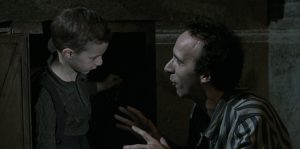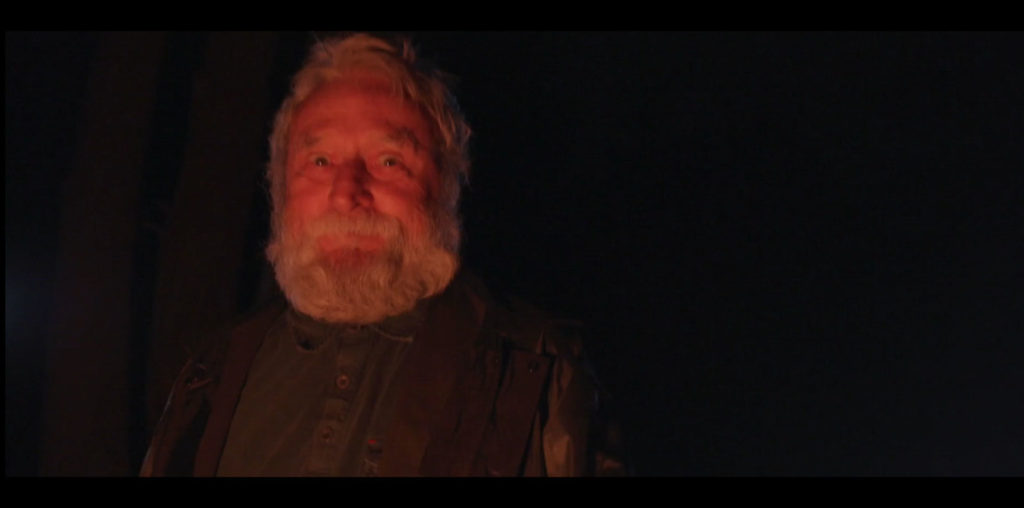
I believe the film from writer/director/star/caterer Roberto Benigni opens with a line like, “It is a simple story, though difficult to tell.” It is also difficult to swallow, and to watch. It seems that every year there’s one film dubiously awarded an array of Oscar nominations that I couldn’t bring myself to see upon release, but that I must watch before beginning my coverage of the big event. Last year it was a film involving a large, ill-fated boat. This year, it’s “Life is Beautiful”. I had thought “The Other Sister” was appalling in its exploitation of the mentally disabled to grab your entertainment dollar, but that was nothing, NOTHING compared to what the funny little Italian man has wrought.
For those blissfully unaware, this film is the story of Guido (Benigni), a very funny (or at least loud) man newly arrived in Tuscany, Italy in 1939. He dreams of opening a bookstore, but first finds love with Dora (Benigni’s real life wife, Nicoletta Braschi). Already unhappily engaged to a local bureaucrat and Black-shirt, he must first win Dora over with his magical charm. The second half of the film picks up a few years later with the happy couple and their young son. Since Guido, and now his pride and joy, are Jewish, they’re carted off (during the boy’s birthday party, no less) to the death train by the Nazis. Dora arrives late and races to the train station where she decides to board the train to what seems to be a minimum-security concentration camp. Guido presents this turn of events as a game with special rules and a prize at the end to prevent the boy’s fear and aid in his survival.
The story going around is that Steven Spielberg (who I’d say has some very developed opinions about the Holocaust and its portrayal in film) nearly walked out on this film in disgust until his wife, Kate Capshaw prevented him because it would look bad to the public. Since he didn’t, I’ll stand up and voice my incredulity and disgust.
Benigni’s charms have always eluded me. He works double-time to be loved and adored but his physical humor makes him out to be a true circus clown, something that is most effective on five-year-olds with Attention Deficit Disorder. To me, he’s like an ugly American tourist always yelling everything to the European locals because that way, they’re sure to “get it”. He fancies himself as the heir to Chaplin and this film is surely meant to be his version of “The Great Dictator”. That film, though, actually tried for some honest social commentary, while this cinematrocity exploits the Holocaust to demonstrate what a great and noble man Benigni, uh, I mean Guido, really is.
Braschi has little dialog, and spends much of her time looking toward her husband with either love or despair. It’s the cliche that women should be seen and not heard and always stand by their man. But the man, even in a concentration camp, runs around with seemingly minimal supervision yelling his lines non-stop. His work detail seems to consist of hauling anvils from one place to another (apparently to drop on the heads of unsuspecting road runners). You’d think the Nazis would shoot him just for some peace and quiet. Benigni is definitely the best actor in the film, if only because everyone else sucks pretty damn hard. If you can detect bad acting done with a foreign language even while you have the distraction of subtitles, it’s gotta stink.
Now we have some honest-to-God precedent, here. In 1972, American super-hyphenate/egotist/funnyman Jerry Lewis made a film called “The Day the Clown Cried”. Now, I am a fan of Lewis, but he’s another one that can and will stoop to anything for your love and adoration. It was said during his boxoffice heyday in the 1960’s, his ego was so out of control that you could almost hear him suck all the oxygen out of a room as he walked by. Anyway, this opus is about, I kid you not, one Helmut Doork (Lewis); a man interned in a series of concentration camps who’s given the job of entertaining the children before they go to the gas chambers. After all, you wouldn’t want the little rascals to go to their deaths with a frown. Hard though it may be to believe, this masterpiece was buried right along with Jerry’s directing career.
The whole shebang was really just an excuse for Dean Martin’s nemesis to wallow in pathos, not unlike he has done for the last century with his telethon. Neither “clown” movie is out to expand our comprehension of one of mankind’s worst atrocities. The Holocaust is used as a shortcut to artistry for the egomaniacs involved. Why be creative when you can just pour this big bottle of sorrow over your dish to get the tangy flavor you so desire?
The sad part is Benigni’s story could have actually worked as a great film.
There’s great work for an actor willing to not impose himself on the final product. As it was, I kept expecting Colonel Hogan to pop up through the floor and cart everyone out through the tunnels. I’m actually reminded of one of America’s other raging narcissists, Barbra Streisand. Her directing effort, “The Prince of Tides” was a great film about loss, emotional wounds, and relationships until Babs single-handedly ruined it with her loud, whining psychologist steam-rolling through the movie. I was surprised her patients could get a word in edgewise. “Life is Beautiful” has the same problem. If Benigni isn’t in the shot, it’s still about him in some way. It’s not about the death of six million Jews. You could almost substitute the Holocaust for the sinking of the Titanic, the great fire of Chicago, or the Civil War. All that’s required of you is your love and respect. All I can afford is five bucks and my indignation, and even that was a little steep. The funny little man may be “benign” by name, but I’m left with an idea for a baseball ball that’s a little more malignant but infinitely more satisfying.



Wow, you really must be a thickheaded simpleton to have written that kind of stuff. Missing the whole reflection on the banality of evil within the events of ww2 and blabbering about “Titanic sinking”, and other pointless remarks, is just embarrassing. How did you ended up writing movie critiques?
You really are insufferable.
I agree. Benigni is a terrible actor. Just watch his other movies if you can stand them. His jokes sound so pathetic.
You, my friend, have no taste
you’re a knob